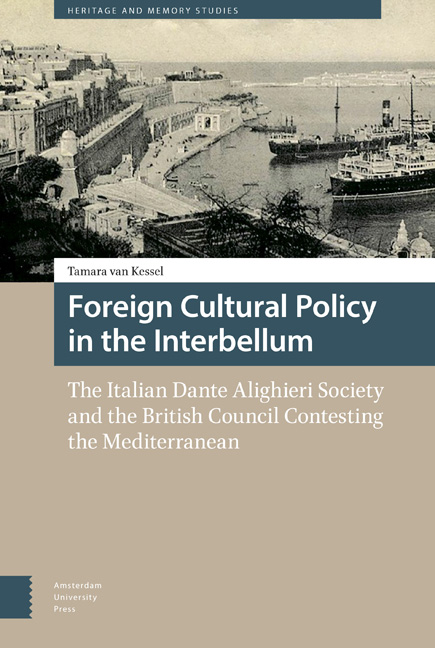 Foreign Cultural Policy in the Interbellum
Foreign Cultural Policy in the Interbellum Book contents
- Frontmatter
- Contents
- List of Illustrations
- Introduction
- 1 The Development of Foreign Cultural Policy
- 2 The Dante Alighieri Society and the British Council: Agency and Independence
- 3 Constructions of ‘Italianità’ and ‘Britishness’
- 4 The Battle for Cultural Hegemony in Malta
- 5 National Culture and Imperial Conquest: The Dante Alighieri Society in Abyssinia and the British Council in Egypt
- Conclusion
- Acknowledgements
- Bibliography
- Index
- Frontmatter
- Contents
- List of Illustrations
- Introduction
- 1 The Development of Foreign Cultural Policy
- 2 The Dante Alighieri Society and the British Council: Agency and Independence
- 3 Constructions of ‘Italianità’ and ‘Britishness’
- 4 The Battle for Cultural Hegemony in Malta
- 5 National Culture and Imperial Conquest: The Dante Alighieri Society in Abyssinia and the British Council in Egypt
- Conclusion
- Acknowledgements
- Bibliography
- Index
Summary
The early twenty-first century is witnessing a revival of cultural promotion as a factor in foreign policy. A peak in this field of activity was reached during the Cold War decades of the previous century, when most notably the government of the United States of America made intense use of cultural means – ranging from its Voice of America radio broadcasts to so-called ‘jazz diplomacy’ – to weaken communism in the Soviet block. After the fall of the Berlin Wall and the collapse of the Soviet Union in 1989, as the contours of a multipolar world emerged, US expenditure and programmes in this domain were considerably reduced. This trend was reversed by the attacks on 11 September 2001 on the World Trade Centre and the Pentagon. The conflict laid bare by 9/11 reignited the idea of a ‘clash of civilizations’ hypothesized in the early 1990s of the world now being divided not by ideologies but by conflicting cultures. This raised the question whether the United States government should once again invest in a cultural programme to ‘win the hearts and minds’ of people in parts of the world where anti-Western sentiment is brewing. Considerable interest has since emerged for what was coined ‘soft power’, defined as ‘the ability to get what you want through attraction rather than coercion or payments [i.e. hard power]’, using culture as well as political values and societal ideals to project an appealing image of one's country. Cultural diplomacy too has become a frequently used term, both in actual policy and in academic study. Originally it referred specifically to the governmental deployment of culture for foreign policy objectives, but nowadays it also applies to the multifarious cultural activities inititiated by non-governmental actors aimed more generally at promoting international understanding.
Within the European Union, the need for a joint cultural strategy in EU external relations has been repeatedly advocated from 2005 onwards. In 2012, this led to the European Parliament's launch of a Preparatory Action that entrusted the European Commission and an expert consortium with the task of developing such a strategy. As a result, on 31 March 2016, the European Commission together with this same consortium established a European Platform for Cultural Diplomacy.
- Type
- Chapter
- Information
- Foreign Cultural Policy in the InterbellumThe Italian Dante Alighieri Society and the British Council Contesting the Mediterranean, pp. 9 - 18Publisher: Amsterdam University PressPrint publication year: 2016


